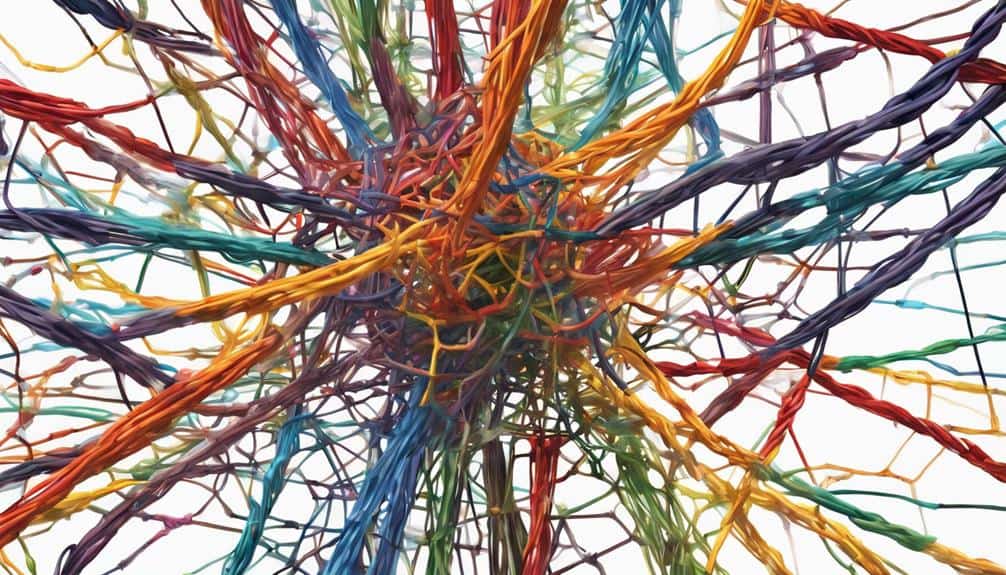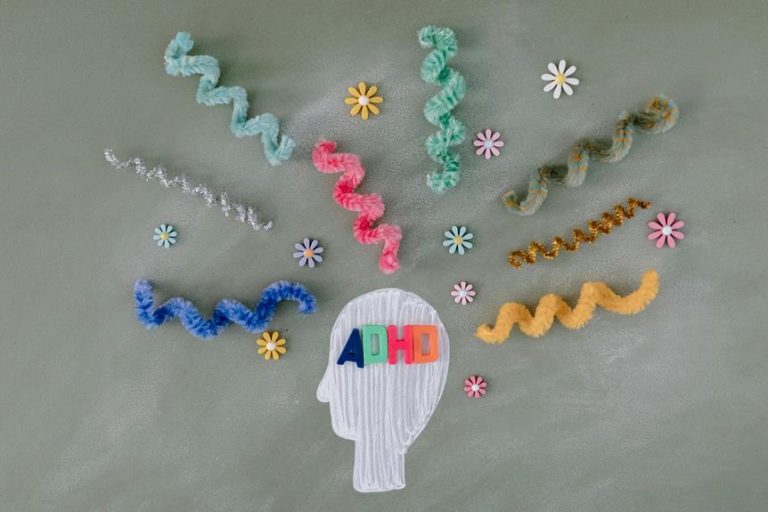Ocd Neurodivergent
As the saying goes, 'a picture is worth a thousand words,' but what about when your mind paints a thousand scenarios? Living with OCD, a neurodivergent condition, brings forth a unique set of challenges and perspectives that deserve exploration.
Let's uncover the intricate intersection between OCD and neurodiversity, shedding light on the complexities that shape individuals' experiences and the diverse ways in which support and understanding can make a difference in their lives.
Key Takeaways
- OCD is a form of neurodivergence characterized by obsessions and compulsions.
- Co-occurrence of OCD with ADHD and Autism is common due to shared genetic factors.
- Understanding the differences and overlaps between OCD, ADHD, and Autism is crucial for tailored interventions.
- Differentiating OCD compulsions driven by anxiety from autistic rituals focused on sensory regulation is essential.
Understanding OCD and Neurodiversity

Understanding OCD and neurodiversity involves examining the intricate relationship between obsessive-compulsive disorder (OCD) and the concept of neurodivergence. OCD, characterized by persistent obsessions and compulsions, is considered a form of neurodivergence due to differences in brain development contributing to the condition.
Obsessions are intrusive thoughts that cause distress, while compulsions are repetitive behaviors or mental acts aimed at reducing anxiety related to these obsessions. Treatment for OCD often includes therapy, such as exposure and response prevention, to effectively manage symptoms.
Individuals with OCD may also have co-occurring neurological conditions like autism, further emphasizing the neurodivergent aspect of the disorder. Understanding the neurobiological underpinnings of OCD is vital in developing tailored interventions that address the specific needs of neurodivergent individuals.
Co-Occurrence With ADHD and Autism

A significant proportion of individuals diagnosed with OCD also exhibit co-occurring symptoms of ADHD and Autism, indicating a notable overlap in these neurodevelopmental conditions. This co-occurrence sheds light on the complexity of neurodiversity and the challenges faced by individuals managing life with these conditions.
- OCD frequently co-occurs with ADHD, with up to 25% of individuals with ADHD also experiencing OCD symptoms.
- Research indicates a significant overlap between OCD and Autism, with up to 37% of Autistic individuals also having OCD.
- Shared genetic and neurobiological factors may contribute to the co-occurrence of OCD with ADHD and Autism.
- The presence of OCD symptoms in those with ADHD ranges from 17-25%, highlighting the common intersection between these conditions.
- Individuals dealing with both OCD and ADHD face a complex puzzle, where the challenges can amplify sensory struggles and social stress.
Understanding these connections is important for providing thorough support and tailored interventions for individuals with these co-occurring conditions.
Teasing Apart OCD, ADHD, Autism

The intricate relationships between OCD, ADHD, and Autism warrant a closer examination to differentiate and understand their distinct manifestations. Research indicates a significant overlap between OCD and ADHD, with around 25% of individuals with ADHD also experiencing symptoms of OCD. Similarly, up to 37% of individuals with Autism exhibit OCD symptoms, emphasizing the common co-occurrence of these conditions. Genetic and neurobiological factors play a pivotal role in the intersection of OCD with ADHD and Autism, highlighting the complex nature of these neurodivergent conditions.
Individuals facing both OCD and ADHD encounter challenges in managing sensory struggles, social stress, and cognitive control issues. These difficulties underscore the intricate web of symptoms and behaviors that can arise from the coexistence of these conditions. Understanding the unique ways in which OCD, ADHD, and Autism interact is essential for tailored interventions and support systems that address the specific needs of individuals dealing with these neurodivergent intersections.
OCD Compulsions Vs. Autistic Rituals

When comparing OCD compulsions with autistic rituals, it's crucial to ponder the underlying motivations behind these behaviors.
OCD compulsions typically arise from anxiety and are linked to specific obsessions, aiming to alleviate distress.
In contrast, autistic rituals are more about sensory regulation and can serve a calming function without the same distress associated with OCD compulsions.
OCD Vs. Autistic Rituals
In distinguishing between OCD compulsions and autistic rituals, the underlying motivations and functions of these behaviors play an important role.
When comparing OCD compulsions and autistic rituals, it's vital to take into account the source of anxiety and comfort, predictability, sensory needs, and control. Here are some key differentiators:
- OCD compulsions: Driven by anxiety and intrusive thoughts.
- Autistic rituals: Provide comfort and predictability.
- OCD compulsions: Rigid and fear-driven.
- Autistic rituals: Varied based on sensory needs and individual preferences.
- Understanding: Helps differentiate between the two in individuals experiencing both.
Understanding these distinctions can aid in recognizing the motivations behind these behaviors and offering appropriate support.
Behavior Patterns Comparison
Comparison between OCD compulsions and autistic rituals reveals distinct behavior patterns driven by different underlying motivations and functions in neurodivergent individuals. OCD compulsions stem from the need to reduce anxiety associated with obsessions, focusing on alleviating distress or preventing harm.
In contrast, autistic rituals often involve repetitive behaviors aimed at sensory regulation, predictability, or maintaining routine rather than anxiety reduction. While individuals with OCD may feel compelled to perform specific rituals for anxiety relief, those with autism may engage in repetitive actions for sensory stimulation or self-regulation purposes.
Understanding these motivations is essential for differentiating between OCD compulsions and autistic rituals in neurodivergent individuals, highlighting the diverse ways in which behaviors serve unique functions within these neurodiverse populations.
Differentiating Compulsions and ADHD Strategies

When distinguishing between compulsions and ADHD strategies, it's vital to understand that compulsions in OCD stem from the need to alleviate anxiety through specific actions, while ADHD strategies aim to enhance executive functioning skills.
Individuals facing both conditions might encounter amplified difficulties with concentration and focus.
Differentiating between these behaviors is essential for tailoring effective interventions to address the unique challenges presented by OCD and ADHD in tandem.
Compulsions Vs ADHD Coping
Differentiating between compulsions seen in OCD and coping strategies utilized for ADHD is essential for tailored and effective neurodivergent management. Compulsions in OCD involve repetitive rituals driven by irresistible urges to alleviate anxiety, while ADHD coping strategies focus on enhancing executive function skills like organization and time management. The differences between these behaviors are critical in understanding how to support individuals with these neurodivergences.
In OCD, compulsive behaviors aim to reduce anxiety, whereas ADHD strategies aim to improve focus and attention. Individuals with OCD may feel compelled to perform specific actions, while those with ADHD may struggle with impulsivity. Recognizing these distinctions allows for more targeted interventions and support strategies.
- Compulsions in OCD involve irresistible urges
- ADHD coping strategies manage executive function challenges
- OCD compulsions are repetitive rituals
- ADHD strategies aim to improve focus and attention
- OCD involves compulsive behaviors; ADHD involves impulsivity
Strategies for ADHD Symptoms
To effectively address ADHD symptoms, it's important to recognize the distinct strategies used to manage executive function challenges compared to the compulsions seen in OCD.
While compulsions in OCD are driven by intrusive thoughts and aim to alleviate anxiety, strategies for ADHD symptoms primarily target issues such as impulsivity, organization, and sustained attention.
Tailored strategies for individuals with both OCD and ADHD are essential as they may require specific interventions to address the unique challenges posed by each condition.
Collaborating with professionals well-versed in both OCD and ADHD can assist in developing effective coping mechanisms and management strategies.
Support and Treatment for Neurodivergent OCD

Individuals with neurodivergent OCD may benefit greatly from tailored support and specialized treatment approaches that consider their unique cognitive processing.
Understanding the intersection of neurodiversity and Obsessive-Compulsive Disorder (OCD) is essential for providing effective care to neurodivergent individuals, including Autistic people.
Therapeutic interventions for neurodivergent OCD should involve accommodations to address sensory sensitivities and cognitive differences.
By acknowledging neurodiversity in OCD treatment, clinicians can offer more personalized and inclusive support to individuals, enhancing treatment outcomes and overall quality of life.
Tailored support plays a pivotal role in ensuring that individuals with neurodivergent OCD receive the necessary care that aligns with their specific cognitive processing, ultimately leading to more effective treatment strategies and improved well-being.
Frequently Asked Questions
What Conditions Count as Neurodivergent?
Conditions such as ADHD and dyslexia, bipolar disorder, Tourette syndrome, PTSD, anxiety, schizophrenia, OCD, borderline personality, eating disorders, substance abuse, intellectual disabilities, and body dysmorphia are recognized as neurodivergent. Understanding and supporting diverse neurological profiles is important for inclusivity.
Is OCD in the Autism Spectrum?
OCD is not within the Autism Spectrum Disorder (ASD) but can co-occur in up to 37% of individuals. While distinct, they share genetic links. Understanding their relationship helps tailor support. Stigma and misconceptions still impact acceptance.
Why Is Living With OCD so Hard?
Living with OCD presents daily struggles due to the relentless cycle of intrusive thoughts and compulsions. The mental health toll is significant, impacting relationships and work. Coping mechanisms, support systems, and seeking help are vital for managing the emotional challenges and reducing isolation feelings.
Can Someone With OCD Fall in Love?
Yes, someone with OCD can fall in love. Love compatibility, relationship challenges, emotional connection, communication barriers, trust issues, coping mechanisms, support system, intimacy struggles, self-care practices, and mental health impact all play roles in managing relationships with OCD.
Conclusion
To sum up, living with OCD as a neurodivergent individual can be quite the rollercoaster. While the constant battle with intrusive thoughts and compulsions may seem overwhelming, it's all just part of the neurodiversity package.
Embracing the quirks and challenges that come with OCD can actually lead to a deeper understanding of oneself and the world around us. So, next time you find yourself washing your hands for the tenth time, just remember – it's all in the name of neurodiversity.







